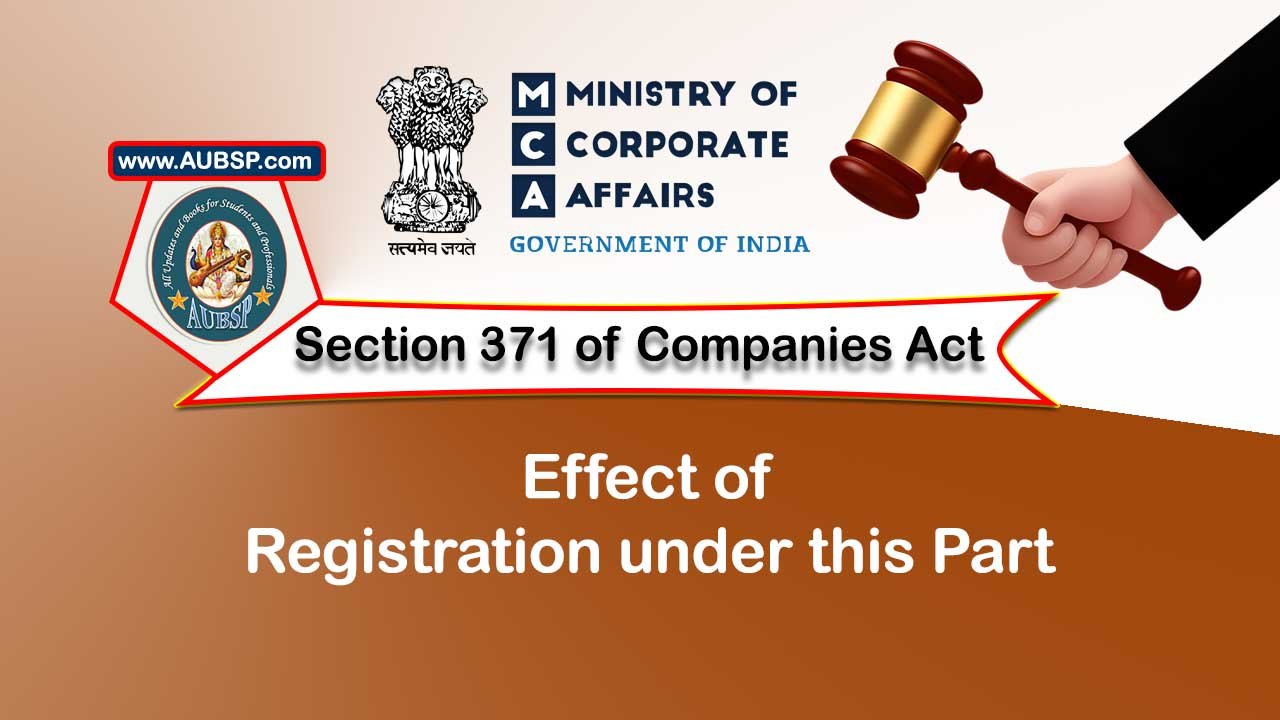Amended and updated notes on section 371 of Companies Act 2013. Detail discussion on provisions and rules related to effect of registration under this Part.
Chapter XXI PART-1 (Section 366–374) of the Companies Act, 2013 (CA 2013) deals with the provisions related to companies authorised to register under this Act. Section 371 of CA 2013 provides for effect of registration under this Part.
Recently, we have discussed in detail section 370 (Continuation of pending legal proceedings) of CA 2013. Today, we learn the provisions of section 371 of the Companies Act 2013.
The provisions of section 371 are effective from 1st April, 2014. You may refer Notification No. S.O. 902(E) issued dated 27-03-2014. In this article, you will learn detail of the provisions of section 371 the Companies Act 2013.
| Name of Act | The Companies Act 2013 |
|---|---|
| Enacted by | Parliament of India |
| Administered by | Ministry of Corporate Affairs (MCA) |
| Number of Chapters | 29 |
| Number of Sections | 484 (470-43+57) |
| Number of Schedules | 7 |
| You are reading: | |
| Chapter No. | XXI (PART-I) |
| Chapter Name | Companies Authorised to Register under this Act |
| Section No. | 371 |
| Section Name | Effect of registration under this Part |
| Monthly Updated Edition | Company Law PDF |
Section 371 of Companies Act 2013: Effect of registration under this Part
Section 371 shall come into force on 1st April, 2014 vide Notification No. S.O. 902(E) issued dated 27.03.2014.
(1) When a company is registered in pursuance of this Part, sub-sections (2) to (7) shall apply.
(2) All provisions contained in any Act of Parliament or any other law for the time being in force, or other instrument constituting or regulating the company, including, in the case of a company registered as a company limited by guarantee, the resolution declaring the amount of the guarantee, shall be deemed to be conditions and regulations of the company, in the same manner and with the same incidents as if so much thereof as would, if the company had been formed under this Act, have been required to be inserted in the memorandum, were contained in a registered memorandum, and the residue thereof were contained in registered articles.
(3) All the provisions of this Act shall apply to the company and the members, contributories and creditors thereof, in the same manner in all respects as if it had been formed under this Act, subject as follows:
- (a) Table F in Schedule I shall not apply unless and except in so far as it is adopted by special resolution;
- (b) the provisions of this Act relating to the numbering of shares shall not apply to any company whose shares are not numbered;
- (c) in the event of the company being wound up, every person shall be a contributory, in respect of the debts and liabilities of the company contracted before registration, who is liable to pay or contribute to the payment of any debt or liability of the company contracted before registration, or to pay or contribute to the payment of any sum for the adjustment of the rights of the members among themselves in respect of any such debt or liability, or to pay or contribute to the payment of the costs, charges and expenses of winding up the company, so far as relates to such debts or liabilities as aforesaid;
- (d) in the event of the company being wound up, every contributory shall be liable to contribute to the assets of the company, in the course of the winding up, all sums due from him in respect of any such liability as aforesaid; and in the event of the death or insolvency of any contributory, the provisions of this Act with respect to the legal representatives of deceased contributories, or with respect to the assignees of insolvent contributories, as the case may be, shall apply.
(4) The provisions of this Act with respect to—
- (a) the registration of an unlimited company as a limited company;
- (b) the powers of an unlimited company on registration as a limited company, to increase the nominal amount of its share capital and to provide that a portion of its share capital shall not be capable of being called-up except in the event of winding up;
- (c) the power of a limited company to determine that a portion of its share capital shall not be capable of being called-up except in the event of winding up,
- shall apply, notwithstanding anything in any Act of Parliament or any other law for the time being in force, or other instrument constituting or regulating the company.
(5) Nothing in this section shall authorise the company to alter any such provisions contained in any instrument constituting or regulating the company as would, if the company had originally been formed under this Act, have been required to be contained in the memorandum and are not authorised to be altered by this Act.
(6) None of the provisions of this Act (apart from those of section 242) shall derogate from any power of altering its constitution or regulations which may be vested in the company, by virtue of any Act of Parliament or any other law for the time being in force, or other instrument constituting or regulating the company.
(7) In this section, the expression “instrument” includes deed of settlement, deed of partnership, or limited liability partnership.


